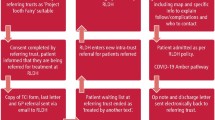Abstract
Objectives To understand the attitudes, skills and knowledge of dental reception and practice management teams relating to urgent dental appointments and to identify additional training needs.
Methods Two focus groups were held with members of dental practice reception and management teams (n = 15). Thematic analysis of the focus group transcripts identified topics, and these were explored in more detail through semi-structured interviews with focus group members (n = 5).
Results Approaches to triaging people with acute dental problems varied in relation to individual skills and practice policies/ethos. Balancing the needs and desires of patients, dentists and other members of the dental team was challenging. Helpful practices included: dedicated appointment slots for unscheduled patients and a system of feedback between clinical and non-clinical teams. Formal training for new members of the frontline team, especially those without a clinical background, could include: assessing/interpreting symptoms, managing diary pressures and dealing with patient expectations/conflict.
Conclusions Receptionists and practice managers have an important role to play in unscheduled dental care. Improved training to undertake this role should help ensure the safety of patients with acute dental problems whilst also optimising the efficient day-to-day running of the practice.
This is a preview of subscription content, access via your institution
Access options
Subscribe to this journal
Receive 24 print issues and online access
$259.00 per year
only $10.79 per issue
Buy this article
- Purchase on Springer Link
- Instant access to full article PDF
Prices may be subject to local taxes which are calculated during checkout
Similar content being viewed by others
References
Public Health England. Urgent Dental Care. Evidence Review 2019; 2019. Available online at https://www.england.nhs.uk/wp-content/uploads/2019/07/commissioning-standard-for-urgent-dental-care.pdf (accessed 15 May 2019).
Sanderson S. Medico-legal considerations in providing emergency dental care in practice. Prim Dent J 2017; 6: 20-25.
Smits M, Hanssen S, Huibers L, Giesen P. Telephone triage in general practices: A written case scenario study in the Netherlands. Scand J Prim Health Care 2016; 34: 28-36.
Mellor R M, Sheppard J P, Bates E et al. Receptionist rECognition and rEferral of Patients with Stroke (RECEPTS): unannounced simulated patient telephone call study in primary care. Br J Gen Pract 2015; 65: e421-e427.
Huibers L, Smits M, Renaud V, Giesen P, Wensing M. Safety of telephone triage in out-of-hours care: A systematic review. Scand J Prim Health Care 2011; 29: 198-209.
Connechen J, Walter R. Telephone Triage in General Practice. Prim Health Care 2006; 16: 36-40.
NHS England. Quick Guide: Best use of unscheduled dental care services. 2015. Available online at https://www.england.nhs.uk/commissioning/wp-content/uploads/sites/12/2015/11/quick-guid-unscheduled-dental-care.pdf (accessed 15 May 2019).
Jones K. Comparison of a predictive algorithm with receptionist triage for priority public dental care. Community Dent Oral 2015; 43: 586-592.
Scottish Dental Clinical Effectiveness Programme. Emergency Dental Care. 2007; Available at http://www.sdcep.org.uk/published-guidance/emergency-dental-care/ (accessed 15 May 2019).
Heggie C. Triaging of non-scheduled appointments in general dental practice: a clinical audit. Br Dent J 2019; 226: 203-206.
Scottish Dental Clinical Effectiveness Programme. Management of Acute Dental Problems. 2007. Available online at http://www.sdcep.org.uk/wp-content/uploads/2013/03/EDC+Guidance.pdf (accessed 15 May 2019).
Cure R, Ireland R. How are we training the whole dental team? Vital 2008; 6: 23-25. Available online at https://www.nature.com/vital/journal/v6/n1/full/vital891.html (accessed 15 May 2019).
Campaign for Administrative Standards and Professional Education for Receptionists and Practice Managers, (CASPER). 'Massive black hole' in manager education. Vital 2012; 9: 9. Available online at https://www.nature.com/vital/journal/v9/n3/full/vital1514.html (accessed 15 May 2019).
Evans D J, Smith M P, Grant S M, Crawford M A, Bond J. Out-of-hours emergency dental services - development of one possible local solution. Br Dent J 2001; 191: 550-554.
Ritchie J, Lewis J, McNaughton Nicholls C, Ormston R. Qualitative research practice: A guide for social science students and researchers. London: Sage, 2014.
Joffe H, Yardley L. Content and thematic analysis. In Marks D F, Yardley L (eds) Research methods for clinical and health psychology. pp 56-68 London: Sage, 2004.
Braun V, Clarke V. Using thematic analysis in psychology. Qual Res Psychol 2008; 3: 77-101.
Myers H L, Myers L B. 'It's difficult being a dentist': stress and health in the general dental practitioner. Br Dent J 2014; 197: 89-93.
Eisner M, Britten N. What do general practice receptionists think and feel about their work? Br J Gen Pract 1999; 49: 103-106.
Heidari E, Andiappan M, Banerjee A, Newton J T. The oral health of individuals with dental phobia: a multivariate analysis of the Adult Dental Health Survey, 2009. Br Dent. J 2017; 222: 595-604.
Vaona A, Pappas Y, Grewal R S et al. Training interventions for improving telephone consultation skills in clinicians. Cochrane Database Syst Rev 2017; CD010034.
Tracy S J. Qualitative quality: Eight "big-tent" criteria for excellent qualitative research. Qual Inq 2010; 16: 837-851.
Corbin Dwyer S, Buckle J L. Reflection/commentary on a past article: "The space between: on being an insider-outsider in qualitative research". Int J Qual Methods 2018; 17: 160940691878817.
Gill P, Baillie J. Interviews and focus groups in qualitative research: an update for the digital age. Br Dent J 2018; 225: 668-672.
Litchfield I, Gale N, Burrows M, Greenfield S. The future role of receptionists in primary care. Br J Gen Pract 2017; 67: 523-524.
Health and Social Care Information Centre. Data on written complaints in the NHS. 2017-18. 2018. Available at https://digital.nhs.uk/data-and-information/publications/statistical/data-on-written-complaints-in-the-nhs/2017-18 (accessed 15 May 2019).
Acknowledgements
We acknowledge the support of the Dental R&D Network attached to the Lancashire and South Cumbria Local Dental Network, Donna Hough, Head of Dental Education and Workforce Dentistry for Health Education England North West, and Stevie Agius, Assistant Professor in Medical Education, Faculty of Medicine & Health Sciences University of Nottingham
Author information
Authors and Affiliations
Corresponding author
Ethics declarations
Health Education England Northwest funded the study.
Rights and permissions
About this article
Cite this article
Kirton, J., Thompson, W., Pearce, M. et al. Ability of the wider dental team to triage patients with acute conditions: a qualitative study. Br Dent J 228, 103–107 (2020). https://doi.org/10.1038/s41415-020-1199-1
Published:
Issue Date:
DOI: https://doi.org/10.1038/s41415-020-1199-1



